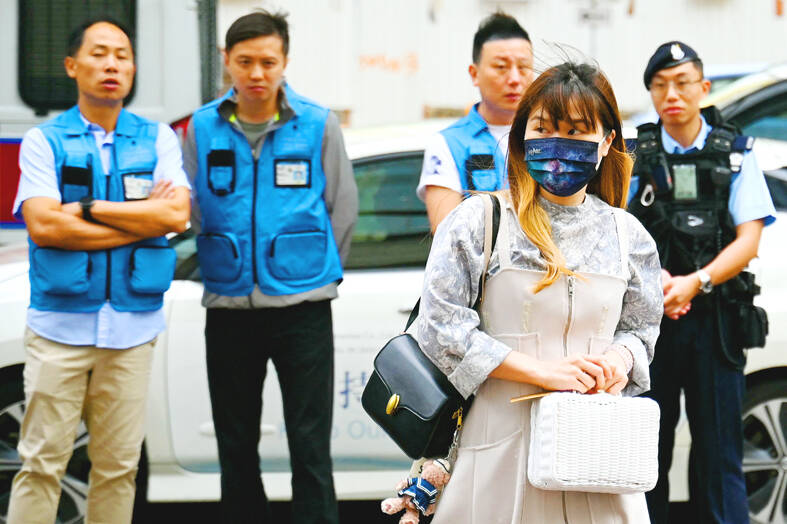The final arguments in Hong Kong’s largest national security trial began yesterday, more than 1,000 days after authorities filed charges against 47 democracy advocates under a law imposed by China to quell dissent.
The defendants represent a cross-section of Hong Kong’s opposition — from democratically elected lawmakers to unionists and academics — which has been effectively squashed after Hong Kong’s National Security Law was imposed by Beijing in 2020.
The 47 defendants were charged with “conspiracy to subvert state power” and face up to life in prison in a case widely considered a bellwether for Hong Kong’s political environment.

Photo: AFP
They were accused of organizing, joining and supporting an unofficial primary election in July 2020 to coordinate candidates for the territory’s legislature.
Judge Andrew Chan (陳慶偉) said that the verdict would be delivered “tentatively three, four months” after the final round of legal arguments, which is expected to last 10 days.
Protesting outside the court, Alexandra Wong (王鳳瑤), a well-known activist nicknamed “Grandma Wong,” waved the Union Jack and held a sign reading: “Free 47, Free all.”
“I hope they can be released immediately. The 47 only wanted to fight for genuine universal suffrage for us,” Wong said. There were “no other motives, not to take the power.”
Prosecutors said the defendants planned to seize a legislative majority to force Hong Kong authorities to meet the “five demands” raised by protesters in 2019.
The demands included launching an independent inquiry into alleged police brutality against protesters and gaining universal suffrage in elections for the territory’s chief executive and lawmakers.
Prosecutors also say the defendants intended to veto the government’s budgets with the aim of forcing the chief executive to step down.
Lead prosecutor Jonathan Man (萬德豪) yesterday argued that the defendants should be convicted even if no violence was involved, as it had become easier for people to manipulate public communication channels to subvert state power.
“We are talking about a conspiracy to have legislators vetoing the budget indiscriminately,” Man said.
The national security legislation was “meant to be a strong law” and should not be narrowly interpreted, he added.
Randy Shek (石書銘), one of the defense lawyers, responded that the defendants were seeking democratic elections for Hong Kong’s leader and lawmakers in line with the territory’s constitutional text, not trying to topple the government.
“What they did was simply seeking to hold power to account, that cannot be subversive,” Shek told the court.
“They relied on a constitutional mechanism to bring about policy changes, that cannot be subversive,” he said.

DEFENDING DEMOCRACY: Taiwan shares the same values as those that fought in WWII, and nations must unite to halt the expansion of a new authoritarian bloc, Lai said The government yesterday held a commemoration ceremony for Victory in Europe (V-E) Day, joining the rest of the world for the first time to mark the anniversary of the end of World War II in Europe. Taiwan honoring V-E Day signifies “our growing connections with the international community,” President William Lai (賴清德) said at a reception in Taipei on the 80th anniversary of V-E Day. One of the major lessons of World War II is that “authoritarianism and aggression lead only to slaughter, tragedy and greater inequality,” Lai said. Even more importantly, the war also taught people that “those who cherish peace cannot

STEADFAST FRIEND: The bills encourage increased Taiwan-US engagement and address China’s distortion of UN Resolution 2758 to isolate Taiwan internationally The Presidential Office yesterday thanked the US House of Representatives for unanimously passing two Taiwan-related bills highlighting its solid support for Taiwan’s democracy and global participation, and for deepening bilateral relations. One of the bills, the Taiwan Assurance Implementation Act, requires the US Department of State to periodically review its guidelines for engagement with Taiwan, and report to the US Congress on the guidelines and plans to lift self-imposed limitations on US-Taiwan engagement. The other bill is the Taiwan International Solidarity Act, which clarifies that UN Resolution 2758 does not address the issue of the representation of Taiwan or its people in

US Indo-Pacific Commander Admiral Samuel Paparo on Friday expressed concern over the rate at which China is diversifying its military exercises, the Financial Times (FT) reported on Saturday. “The rates of change on the depth and breadth of their exercises is the one non-linear effect that I’ve seen in the last year that wakes me up at night or keeps me up at night,” Paparo was quoted by FT as saying while attending the annual Sedona Forum at the McCain Institute in Arizona. Paparo also expressed concern over the speed with which China was expanding its military. While the US

‘FALLACY’: Xi’s assertions that Taiwan was given to the PRC after WWII confused right and wrong, and were contrary to the facts, the Ministry of Foreign Affairs said The Ministry of Foreign Affairs yesterday called Chinese President Xi Jinping’s (習近平) claim that China historically has sovereignty over Taiwan “deceptive” and “contrary to the facts.” In an article published on Wednesday in the Russian state-run Rossiyskaya Gazeta, Xi said that this year not only marks 80 years since the end of World War II and the founding of the UN, but also “Taiwan’s restoration to China.” “A series of instruments with legal effect under international law, including the Cairo Declaration and the Potsdam Declaration have affirmed China’s sovereignty over Taiwan,” Xi wrote. “The historical and legal fact” of these documents, as well